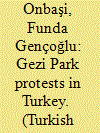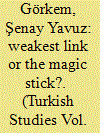| Srl | Item |
| 1 |
ID:
145632


|
|
|
|
|
| Summary/Abstract |
This study aims at a critical analysis of the Gezi Park protests of 2013. Without denying the importance of understanding their ‘before and after,’ it tries to understand what happened ‘during’ the Gezi protests. It argues that the practice of Gezi can be understood via the theory of radical democracy, whose core concepts and premises are particularly appropriate for making sense of what happened during Gezi protests. Drawing on those concepts this study argues that (i) Gezi was a manifestation of the ‘undecidability and contingency of political identities’; (ii) a highly suitable atmosphere developed during the protests for the emergence of a ‘(counter) hegemonic relationship’ in the radical democratic sense of the term; (iii) Kemalism unsuccessfully attempted to act as ‘the nodal point’ to fix the free floating of ideological elements; (iv) ultimately, no particularity managed to take over the representation of ‘the chain of equivalence’ established among the elements excluded from the current neoliberal-conservative hegemony.
|
|
|
|
|
|
|
|
|
|
|
|
|
|
|
|
| 2 |
ID:
151665


|
|
|
|
|
| Summary/Abstract |
Based on ethnographic fieldwork conducted in Istanbul with participants of the Gezi Park Protests, this article studies how young people relate to the political. One of the most important priorities of this article is to discover new ways of thinking about young people and politics from a cultural perspective, and thereby rethink the notion of participation in relation to the political. Everyday life, values, and cultural practices are presented as lenses through which young people define the political. ‘Politics as doing’ emerges as the greatest commonality in the diverse definitions of the political, underlining the real, practical, and daily roots and effects of political action. Analyzing the diversity and overlaps within the differing perceptions and practices of the political by young people, this article underlines the need, and also possible ways, for thinking about youth political participation through new lenses.
|
|
|
|
|
|
|
|
|
|
|
|
|
|
|
|
| 3 |
ID:
151666


|
|
|
|
|
| Summary/Abstract |
This article summarizes the first part of the findings of a larger study which gathers data on Turkish activists’ perceptions on the scope, strength and limitations of digital activism. Specifically, the study explores what strength Turkish activists attribute to digital activism in achieving certain objectives, whether Turkish activists are optimistic, pessimistic or persistent in their attributions related to digital activism, and whether they believe in the possibility of an e-revolution. Both quantitative and qualitative data were collected via a web-based survey of 302 activists. The survey employed a Likert Scale to measure the efficacy that Turkish activists attribute to digital activism in achieving different objectives as well as six open-ended questions that provide in-depth qualitative data.
|
|
|
|
|
|
|
|
|
|
|
|
|
|
|
|
| 4 |
ID:
151668


|
|
|
|
|
| Summary/Abstract |
The research puzzle that our paper focuses on is the struggle of youth organizations to have their voice heard in public policy processes. We examine the implications of occupygezi in establishing, or not, a new relationship with the political domain and policy makers in Turkey. By drawing on a policy analysis framework, this paper looks at whether occupygezi opened up new windows of opportunities for social and political change for youth activists in Turkey. In doing so, we rely upon the results of a number of in-depth interviews conducted in 2015/16 in Turkey with representatives of youth organizations.
|
|
|
|
|
|
|
|
|
|
|
|
|
|
|
|